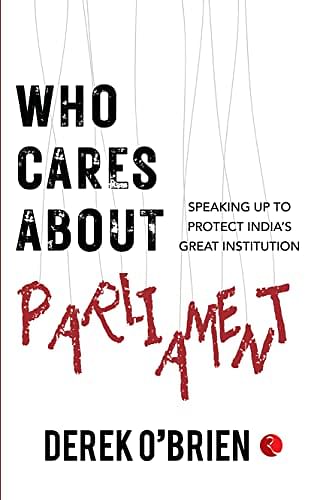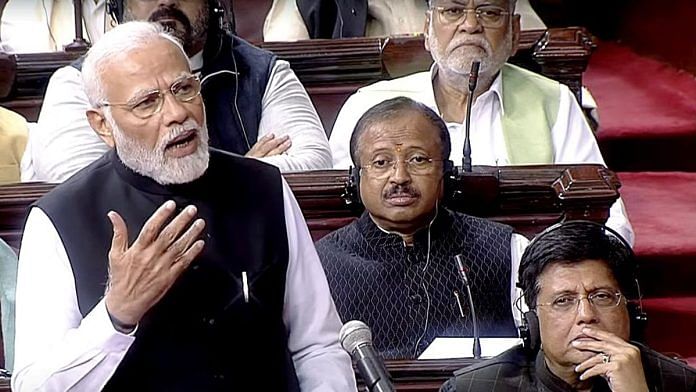Let me begin by sharing with you one of the many anecdotes about Parliament. About a year before the United Progressive Alliance (UPA)-II was voted out of power, the Dr Manmohan Singh-led government was gearing up to get a bill passed in the Rajya Sabha (I can’t recall which Bill, but that’s not the important part of the story). Rajeev Shukla, the then Minister of State for Parliamentary Affairs, was doing what was expected of him— rustling up everyone in the treasury benches to be present and voting. It was also his brief to ensure that the nominated members like Sachin Ramesh Tendulkar and Bhanurekha Gemini Ganesan, who were otherwise rarely spotted in the House, were present and voting in the Rajya Sabha.
Everything went well for the government; the bill was duly passed and Shukla was quite chuffed with himself as we hung around the water dispenser in the lobby of the House. After the proceedings were adjourned for the day, among the MPs who were leaving was the lady herself, Rekha. She stopped in her tracks as the ever-polite and ‘friends-with-all’ minister Rajeev said: ‘Thank you so much for coming today Rekha ji, thanks a lot.’
The Bollywood star turned-MP smiled broadly and replied: ‘It’s my pleasure. No problem. The next time you want me to come, just invite me again and I will be here.’
When the lady was not within earshot, we chuckled and the minister, in mock disbelief, articulated what all of us were thinking—seriously, you have to invite a fellow MP to be present in Parliament!
Perhaps it would be unfair on my part to be harsh on the Bollywood icon-cum-nominated MP who actually believed that she needed to be invited to attend Parliament. Prime Minister Narendra Modi is just as condescending in his relationship with the Lok Sabha and Rajya Sabha. Who cares about Parliament.
Consider this: Modi spent 11 hours and 33 minutes delivering speeches in West Bengal during the 2021 Assembly Elections in the state. But he attended Parliament for less than four hours that year—across the Budget, Monsoon and Winter Sessions. In effect, the ‘high priest’ of the ‘temple of democracy’ spent about thrice as much time delivering speeches in a state election than attending Parliament in 2021.
Then, for someone who loses no opportunity to declare his undying fealty to the institutions of democracy, Modi has been remarkably remiss in fulfilling his pledge. Prior to almost every session of Parliament, the PM declares rather grandly that the government is ready to face all questions in Parliament. If proof of the kheer is in the eating, the aftertaste in this case has been bitter.
Since Modi became PM, the Prime Minister’s Office (PMO) has answered only 13 questions, compared to 85 questions answered by Dr Manmohan Singh’s office during the previous 10 years of the UPA government. When was the last time the PM answered a question on the floor of Parliament? Monologues on airwaves with a packaged radio programme are no substitute.
The PM is in good company. Former Chief Justice of India (CJI), and now Rajya Sabha backbencher, Ranjan Gogoi, also cocks a snook at Parliament. After setting a precedent by becoming the first former CJI to accept a nomination to the Rajya Sabha just four months after his retirement, Gogoi (in)famously said: ‘I go to the Rajya Sabha whenever I feel like it…when I think there are matters of importance on which I should speak […] I go there at my choice, I come out at my choice.’
Modi and Gogoi are cut from the same cloth. When the head of the government and the former head of the judiciary show such disdain towards Parliament, are you surprised that India has been sliding steadily down the ranks of the Democracy Index since 2014 and is now classified as a ‘flawed democracy’?
But Modi’s less-than-respectful behaviour towards Parliament is not out of character. Its seeds lie in the so-called Gujarat Model of Development (by the way, have you noticed that the PM doesn’t refer to it anymore). When Modi was the chief minister (CM) of Gujarat, the Legislative Assembly in the state had the dubious distinction of meeting the least number of times, lower than under all the previous CMs. In 2012, after 11 years in power, in spite of having a significantly longer tenure than any of his predecessors, the number of sittings in the Gujarat Assembly was 327, an average of less than 30 sittings a year. Even within the BJP, his predecessor Keshubhai Patel, who was CM for four years and two months, had an average of almost 50 sittings a year.
Also read: Govt has been counting India’s poor all wrong—it’s ad hoc, arbitrary
Understanding ‘Parliamentophobia’
Even Modi’s biggest critics acknowledge that he is a brilliant orator, and often, the master of the teleprompter. Then why the reticence to speak in Parliament? Why shy away from regularly participating in debates? For someone so voluble and garrulous everywhere, from Kedarnath to Kutch, why does he suffer from parliamentophobia? One explanation could be the startling gap between what he promises in his speeches and what he actually delivers. The gap is huge.
As PM, he has presided over the highest unemployment in 45 years—more than one crore jobs were lost only during the pandemic. Then, there was his promise of providing every Indian with a pucca house with toilet, water and electricity, as well as his pledge to double farmers’ incomes—he had promised to do all of this by 2022. Nothing happened. The launch of the bullet train is running five years late. The vision (sic) of turning India into a $5-trillion economy by 2024 doesn’t have a ghost of a chance of materializing.
Even a national disaster like demonetization was never discussed in Parliament before it was announced. There again, the gasbag was at work: demonetization was expected to end black money, eliminate fake currency, stop terrorism and end corruption. None of these happened. Remember one of the most famous of his hollow promises, ‘Give me 50 days over scrapped notes, punish me if problems persist.’ It is still business as usual.
With such a ‘100 per cent’ track record of failure, it is not surprising that the PM prefers to avoid Parliament where he cannot lie to the people with the same impunity he does elsewhere.
Stringent parliamentary rules governing privilege deter even megalomaniacs.
Check the parliamentary proceedings, and you will find that Modi was not present in either House during the discussion on the CAA, the abrogation of Article 370 and the passage of the Muslim Women (Protection of Rights on Marriage) Act, 2019 (ban on triple talaq).9 I am not getting into the merits or demerits of any of these legislations, but the bigger issue is, why was the PM missing from Parliament?
Likewise, he was conspicuous by his absence during the passage of the Central Vigilance Commission (Amendment) Bill, 2021, extending the term of the Central Vigilance Commission and the Election Laws (Amendment) Bill, 2021, permitting the linking of Aadhaar to voter IDs. The latter law was passed with 11 minutes of discussion in the Lok Sabha and 38 minutes in the Rajya Sabha, in spite of members calling for the Bill to be sent to a committee for scrutiny.
Management guru Peter Drucker, in another context, said: ‘Listening is not a skill; it’s a discipline. Anybody can do it. All you have to do is keep your mouth shut.’
Listening is a skill that PM Modi lacks. Why doesn’t somebody advise him that good orators have to also be good listeners to transform themselves into great parliamentarians.
 This excerpt from Derek O’ Brien’s ‘Who Cares About Parliament: Speaking Up to Protect India’s Great Institution’ has been published with permission from Rupa Publications.
This excerpt from Derek O’ Brien’s ‘Who Cares About Parliament: Speaking Up to Protect India’s Great Institution’ has been published with permission from Rupa Publications.



